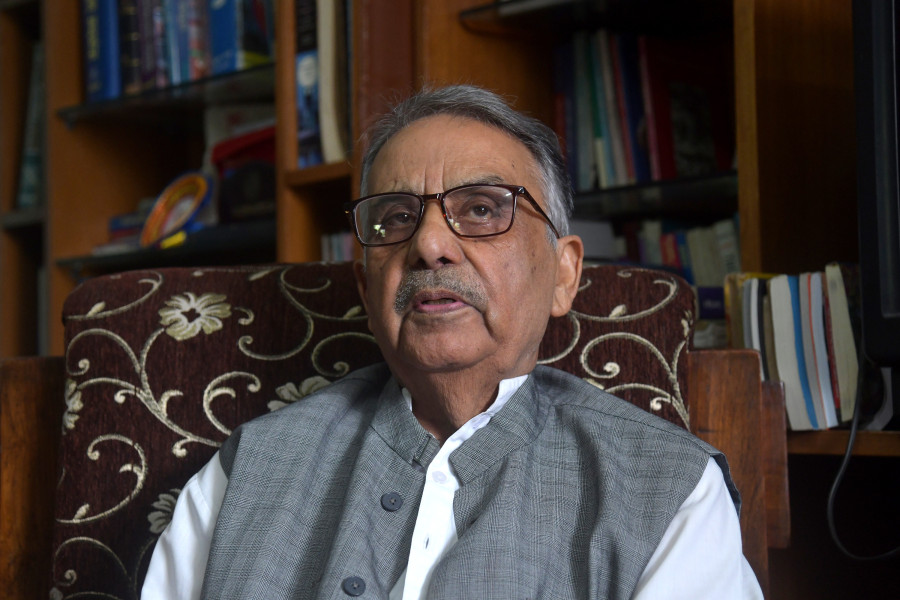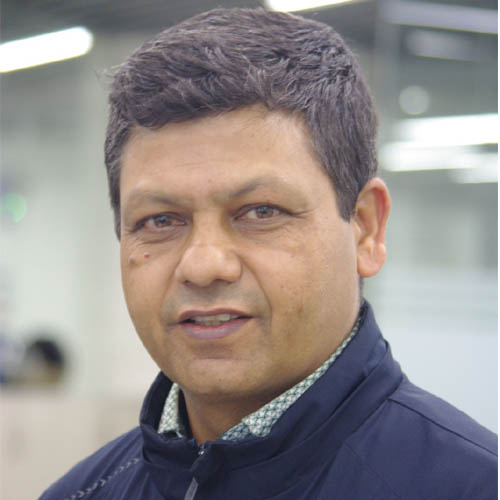Interviews
Our democracy will function only if communists are democratised
Daman Nath Dhungana, speaker of the first Parliament elected after the 1990 political change, on latest parliamentary obstructions and the failure of the political parties to act responsibly to make Nepal’s legislative process functional.
Thira Lal Bhusal
Speaker of the first Parliament elected after the 1990 political change, Daman Nath Dhungana has over the years been an outspoken critic of anomalies in state institutions. This time, talking to Post’s Thira Lal Bhusal, he discusses the latest parliamentary obstructions and the failure of the political parties to act responsibly to make Nepal’s legislative process functional.
How do you see the frequent and prolonged obstruction of our Parliament?
Parliament obstruction is an unacceptable act. There are other ways to protest, even in the House. One particular party can’t hold the legislature hostage as Parliament belongs to the country. The ongoing House obstruction should be seen in a perspective. It is happening at a time when the image of Nepal’s key institutions is eroding. Parliament’s lack of credibility has a chain effect on other institutions. For instance, there is now a lack of trust between the parties. Inter-party relations are bitter.
Prachanda ji [Pushpa Kamal Dahal of the Maoist Centre] forged an electoral alliance with [Nepali Congress president Sher Bahadur] Deuba ji. But later he became prime minister with the CPN-UML’s support. Then, he again ditched the UML and sought Congress backing for a confidence vote in Parliament. This type of opportunism has also eroded Parliament’s image in the public eye. The ongoing obstruction is clearly related to corruption cases. In general, we find a pattern after the promulgation of the new constitution.
Most of those in the governments formed in this period have been found involved in corruption cases. As the Central Investigation Bureau (CIB) started a probe into corruption cases, leaders feared prosecution. They have been obstructing the House as they don’t want any investigation and exposure. They want to escape trial. So the latest Parliament obstruction is more dangerous than the previous ones.
Are you suggesting it’s all a matter of give and take among political parties?
As almost all the parties are involved in corruption, they want to do some give and take and resolve differences by sharing positions. I don’t say Prachanda ji is not working seriously against corruption, but the situation is such that he may have to negotiate with other parties. He may patch up for the longevity of his government. But this will only further anger people and ultimately even threaten the constitution and the system developed under it.
How is House obstruction a threat to the parliamentary system?
The previous Parliament (2017-2022) couldn’t do any substantive work as politics during its entire term revolved around two disputes: Whether the two communist parties can stay together and whether the House should be dissolved. This is how Parliament’s erosion started. Sensing that he was being ousted, KP Sharma Oli dissolved the House. Some argue that the constitution isn’t working. Politicians are now saying that in this mixed electoral system, parties don’t get a majority and coalition governments don't function well. We brought about radical political changes but we didn’t learn how to run our democracy responsibly. As successive governments have failed to deliver, those who want to undo recent political changes are emboldened. A section of the intelligentsia also backs the idea. This is how multiple complications are emerging.
Speakers are often blamed for their inability to run the House effectively. Is this a valid criticism?
Parliament regulation gives the Speaker extensive authority. If a Speaker is committed to making the House vibrant, they can do so. The Speaker is definitely a commander of the House but it is a team that runs the House. The team comprises the prime minister, the leader of the main opposition, deputy Speaker, whips from political parties and committee chairs. They should all work in a collaborative and cooperative way.
The Speaker is also a mediator and the mediation they do to run the House is important. Now, the UML is trying to take advantage of the Speaker who came from the party. This is how people see it. In this case, the Congress and the Maoist Centre made a mistake. They should have elected a consensus leader as Speaker but they shared such a key position as part of a power-sharing deal.
Are the initiatives being taken by the current Speaker to reopen the stalled House adequate?
The Speaker’s, including the current one’s, is a difficult position. His mother party wants some favour while the opposition parties complain that he is ignoring them. There is a high chance of the Speaker being misunderstood in difficult times. If you take my reference, I won the confidence of the opposition parties. I don’t doubt the present Speaker’s intent. But as he wasn’t a top leader in his party, he might not be able to assert himself even within that party. I didn’t have that problem as I was one of the senior-most Congress leaders when I was elected the Speaker. I was a freedom fighter and a leading Congress leader. So I could assert myself. But the present Speaker may not have that advantage.

Can we say that political parties haven’t chosen the right candidates for top state positions in recent years?
Yes, there is a fault in candidate-selection. The problem is that our leaders aren't ready to work as per the spirit of the constitution and democratic values. They are only guided by immediate gains. I stress that the candidates, mainly for the two state positions—President and Speaker—must not be selected based on power-sharing deals. Those holding these two positions must be able to build consensus among the political parties when there is a difficult situation.
The present-day political parties and the state machinery aren’t capable of handling corruption. They aren’t in a position to carry out a serious investigation and punish the guilty, as all the three parties are involved. They don't trust each other. Now the campaign against corruption has begun. The leaders should reach an inter-party understanding to take this process to a logical end. This Parliament has been overshadowed by corruption. It is a place to raise the issues of corruption, investigate them and find facts but nothing of the kind is happening.
It’s been nine months since the November polls. But this Parliament has passed only one law except for some budget-related bills. How do you see this lackadaisical performance?
That’s why I say the previous Parliament was overshadowed by two disputes, whether the two communist parties should stay together and whether the House of Representatives can be dissolved. Initial indications from the present House suggests the issue of corruption will dominate it. People are keenly watching whether the government can genuinely investigate corruption cases.
Chairs of the House committees haven’t been elected. In this situation, how can the public’s concerns be addressed?
They started the wrong practice of picking committee heads as per power sharing deals instead of electing capable ones. Another worrying thing is that the Constitutional Council and hearing committee have failed. The judiciary has been led by acting chief justices for long. This is how key state institutions have been made non-functional. The Supreme Court is not getting the chief justice on time. Without chief justice, so many vacant seats of other judges can’t be filled. Post-constitution politics has already entered a vicious circle.
The problem is then with the larger politics rather than with the current Parliament, you reckon?
See, we have to go back and see the big picture. After the political change in 1950, we adopted a national political philosophy of Parliamentary democracy. The monarchs wanted to destroy it, others wanted to protect it. After that, the communists emerged. But the communists have become perverted. On the other hand, the democratic party, Nepali Congress has become weak. Despite being the largest force by number, the party and its leadership has become weak in delivery and in values. Now the perverted communists are manipulating the weak Congress. Nepal’s communists are still not fully democratised. Nepal’s democracy can function properly only if the communists are fully democratised, and there is a competition between democratic forces. In a democracy, there should be a competition between forces with ideological proximity.
When you became Speaker of the first Parliament elected after the reinstatement of democracy in 1990, you said, “The government belongs to the majority while the Parliament belongs to the minority”. Have our politicians heeded it?
I said that as I realised the need for institutional building, having struggled for democratic rights for 30 years after 1960. I carried a spirit of revolution. I tried to implement that in Parliament. But there is no spirit of change in present-day leaders. Prachanda ji might have some but his difficulty is that he carries with him a violent background and he doesn't have a team.
Protesting parties claim that they were forced to resort to disruption after the ruling parties didn’t listen to them.
That might be the case. Ruling parties should listen to them. But this time, the UML obstructed the Parliament to protect itself from investigation. It seems the UML may continue the disruption if there is no compromise deal among the parties. This is how corruption issues have made the Parliament hostage.




 13.12°C Kathmandu
13.12°C Kathmandu




.jpg&w=200&height=120)







